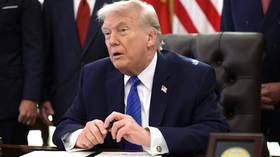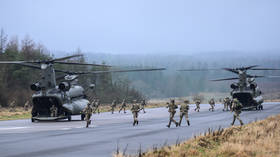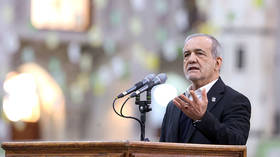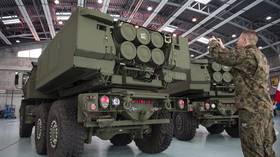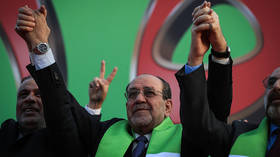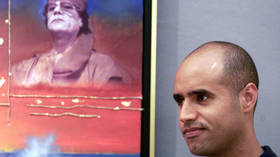Journalists under attack, hypocritical Western media remains silent
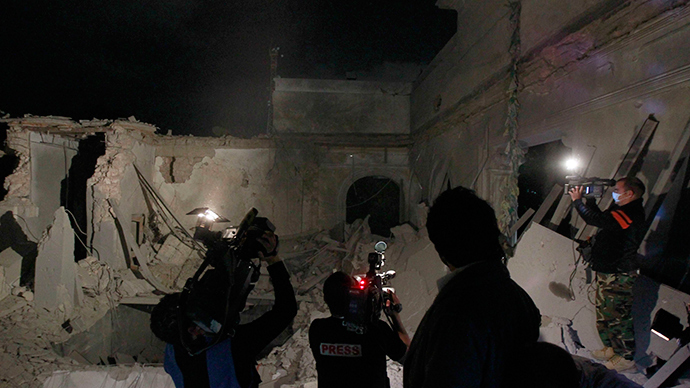
The suspicious death of US-born journalist Serena Shim, and the deafening silence on the story in the US, is merely the latest example of the blatant double standard employed by the Western media.
Shim, a 29 year old American journalist of Lebanese descent, had been covering the ongoing war in Syria, specifically the current battle between ISIS militants and Kurdish forces near the Syrian town of Kobani, from the Turkish-Syrian border. Shim was traveling in a rental car back to her hotel after reporting from the Turkish town of Suruc near the Syrian border, when the car was allegedly struck by a heavy vehicle, killing Shim.
While Turkish authorities quickly contended that her death was an accident, many around the world, including executives and senior staff members of Press TV – the Iranian news agency for which Shim was working – have expressed doubts about the circumstances of her death, describing it as “suspicious.” Such suspicions are clearly warranted as the alleged accident came just one day after Shim expressed fears for her own safety after receiving death threats from Turkish intelligence (MIT). In an interview with Press TV just after being accused of being a spy and receiving the threats, Shim stated:
“I’m very surprised at this accusation – I even thought of approaching Turkish intelligence because I have nothing to hide... I am a bit worried, because...Turkey has been labeled by Reporters Without Borders as the largest prison for journalists…so I am frightened about what they might use against me... We were some of the first people on the ground –if not the first people – to get that story of…militants going in through the Turkish border…I’ve got images of them in World Food Organization trucks. It was very apparent that they were militants by their beards, by the clothes they wore, and they were going in there with NGO trucks.”
This revealing interview highlights the fact that Shim, unlike many Western journalists reporting on the Syrian conflict, was actually involved in a serious investigation, including documenting the collusion between Turkish intelligence and militant extremists to smuggle fighters and weapons into Syria. While this aspect of the Syrian conflict has been documented by Reuters, the New York Times, and others, Shim was on the ground covering the story, getting documentary evidence including photos and video of the militants in NGO trucks, a blatant violation of international law. It is precisely this damning evidence of Turkey’s involvement in the Syrian war that likely sparked the death threats against her and, quite likely, led to her possible assassination.
Shim’s tragic death has sparked outrage, not to mention tremendous grief, from her family and colleagues who have called for a thorough and impartial investigation into the circumstances of her death. Condolences and expressions of sorrow from around the world have come pouring in to both Press TV and the Shim family. However, quite conspicuously, there has been a near total media blackout in the West, especially in the United States, the country of which Shim was a citizen.
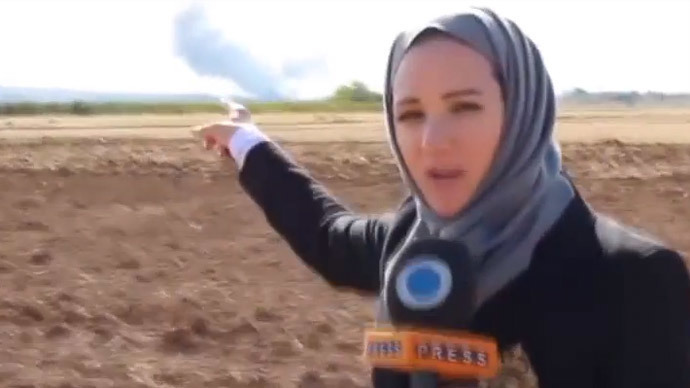
When Are Journalists’ Deaths Newsworthy?
In the wake of Shim’s death and the shameful lack of coverage it has received in the West, disturbing questions emerge as to the attitude of Western media toward the assaults, kidnappings, and killings and/or suspicious deaths of journalists. Specifically, major media outlets and their respective governments and corporate owners must explain why certain journalists’ deaths are international news stories sparking global outrage and serving as the pretexts for military engagement, while others are conveniently swept under the rug, receiving at best a passing mention.
The international outcry over the kidnapping and beheading of James Foley dominated the headlines for weeks, and served as the immediate justification for the US-led airstrikes against ISIS in Syria. Aside from glowing tributes to Foley from nearly every major media organization, and a memorial page dedicated to him and his fans established by Reporters Without Borders, even President Obama spoke of Foley, describing him as “a man who lived his work, who courageously told the stories of his fellow human beings, who was liked and loved by friends and family...We will do everything we can to protect our people and the timeless values that we stand for.” Such high praise coming from the President himself demonstrates the political and social significance of Foley’s death for the US.
And yet, Serena Shim who, like Foley, was a US citizen receives no such coverage. There are no glowing tributes from news organizations, most of which haven’t even bothered to report on her suspicious death. There are few stories even mentioning the incident and, the few that there are, painstakingly attempt to frame the incident as an accident, validating the assertions of Turkish officials, despite there having been no investigation, and the more-than-coincidental death threats she had received just hours before. There has been no public statement as yet from Reporters Without Borders or any other press freedom organization charged with protecting and promoting freedom of the press and the universal protection of journalists. Why? What is the difference between Serena Shim and James Foley that explains the striking disparity in the media coverage and public outcry?

It’s What You Say and Who You Work For
Serena Shim’s death illustrates quite clearly the double standard applied by Western media and policymakers; Foley’s death was a national tragedy, Shim’s death a mere footnote at best. The inescapable fact is that this disparity is due not to whom they were, but rather who they worked for. Foley was a willing participant in the US-NATO war in Libya, “embedding” himself with the so called “rebels” who, thanks to a massive NATO bombing campaign that effectively destroyed Libyan military capabilities, participated in the overthrow of Muammar Gaddafi and the government of the Libyan Arab Jamahiriya.
Foley presented a picture of heroism and self-sacrifice on the part of the rebels, many of whom had direct links to al-Qaeda and global terrorist networks stretching from Afghanistan to Saudi Arabia, portraying them as true patriots liberating their country of a brutal dictator. In effect, Foley was one of the chief propagandists for the NATO operation in Libya, shooting photographs that became central to the image Washington and NATO wanted to portray.
In stark contrast, Shim was working for Iran’s Press TV, a news outlet funded by the Iranian government which provides a counter-narrative to the one presented in the Western media. Press TV’s reportage has been critical of the international operation against Syria, including countless reports, debates, and analysis of the role of Turkey, Saudi Arabia, Qatar, Washington, Tel Aviv, and others in fomenting the war thus far.
Press TV has been deeply critical of US policy vis-à-vis Syria and Iraq, and has presented numerous reports questioning the role of international actors in those conflicts. Shim herself was killed just hours after breaking the news of militant extremists crossing the border into Syria with the assistance of Turkish intelligence, using World Food Program trucks. This bombshell story substantiated the countless other reports dating back to 2012 of Turkish intelligence’s involvement in precisely this sort of operation.
And so, it is clear that the media and government response to the death of journalists directly correlates to the kind of reporting being done. If you are journalist who works for a Western media outlet, and substantiates and propagates the Western narrative, then you are a hero and your death is a national tragedy that elicits a swift response. If, however, you are a journalist who works for a non-Western news organization, and is critical of the West and its policies and actions, then your death is simply not newsworthy and will be quickly forgotten. Such double standards, hypocrisy, and egregious immorality typify Western attitudes towards journalists and the role of the media.

Sadly, Not the First or Last Time
Perhaps the most appalling aspect of this story is the fact that Shim’s death is only the latest in a long line of journalists’ deaths in recent months and years that have been almost entirely ignored by the Western media. From Ukraine to Syria and Gaza, journalists have been killed in alarming numbers while their stories are suppressed in the West.
In Eastern Ukraine, a number of Russian journalists have been assaulted, kidnapped, tortured, and/or killed by the US-backed regime’s military and paramilitary forces. In June 2014, Igor Kornelyuk and Anton Voloshin, both employed by Russia’s Rossiya TV channel, were killed near Lugansk. Despite repeated denials from the Kiev regime regarding the deliberate targeting of journalists, eyewitness accounts from the scene allege that the Russian journalists were specifically targeted by the Ukrainian forces. Viktor Denisov, the surviving member of the news crew, explained, “One hundred percent it was not accidental fire, it was an aimed action from the National Guards’ side.” Despite this eyewitness account, coupled with the shocking footage that Denisov obtained of the attack, there was almost no coverage of the incident in the international press.
Also in June 2014, Anatoly Klyan, a cameraman from Russia’s Channel One television, was killed by forces loyal to the US-backed regime in Kiev. Shot in the stomach while aboard a bus full of mothers of army conscripts that was shelled by Kiev’s military forces, Klyan died before he could make it to a hospital. While there were initial stories covering the incident in the Western media (mostly from British news outlets), there was no international outcry to protect journalists in Ukraine, no heightened scrutiny of the crimes of the Kiev military and paramilitary forces, no pressure exerted on President Poroshenko by his Western backers. One could be forgiven for thinking that the incident was quietly swept under the rug in hopes that it would be forgotten.
In August 2014, Rossiya Segodnya (formerly RIA Novosti) photojournalist Andrey Stenin was killed when the car he was travelling in was attacked by Ukrainian forces, along with a number of other cars carrying civilians out of the conflict zone. Stenin was reportedly missing for over a month until it was finally confirmed that he had been killed. While he was believed to have been kidnapped, there were some expressions of support and calls for his release, particularly from the Committee to Protect Journalistswhich has documented a number of crimes committed against journalists, especially Russian journalists, by Ukrainian authorities. However, beyond the professional community, there was decidedly little outcry, especially in the West where news of his disappearance and death went nearly unmentioned.

The deaths of these and other Russian journalists in Ukraine are, sadly, not the only attacks on non-Western journalists. Iran’s Press TV, which is now mourning the loss of Serena Shim, is all too familiar with this story. In September 2012, Press TV’s Damascus correspondent Maya Nasser was killed by a sniper while on air reporting on the attack on the Syrian army’s general staff headquarters. The fact that he was killed by a sniper, an obvious deliberate targeting of a journalist, should have made him a cause célèbre for media organizations around the world. And yet, they remained mostly silent because Nasser was not part of the Western media, and was instead reporting inconvenient facts that disputed the Western narrative of “moderate rebels” fighting against “the brutal dictator Assad.” The obvious lesson here is that journalists are legitimate targets if their reporting runs counter to the agenda of Washington and its allies.
Finally there is the tragic case of Gaza, a veritable killing field for journalists, where at least eight journalists were killed by Israeli forcesduring their war on Gaza in the summer of 2014. While the International Federation of Journalists lodged its formal protest with the United Nations against the targeting of its colleagues, and other organizations such as Al Haq conducted thorough investigations of the incidents, the issue was almost entirely ignored by Western media, especially US media which rather predictably provided a one-sided portrayal of events on the ground in Gaza. While much of the US media uncritically reported from the comfort and safety of Jerusalem, Tel Aviv, Amman, and other cities, Palestinian journalists were losing their lives to report the horror taking place on the ground in Gaza. The silence from Western media was deafening.
It is critical to reiterate the fact that the Western media, which is always so keen to trumpet its commitment to freedom of the press, among many others, is conspicuously silent on the deaths of colleagues who happen to work for non-Western outlets. It would seem that outrage is more a function of ideology than of genuine support for fellow journalists. In this way, the Western media makes itself complicit in the crimes. By abrogating their responsibility to objectively report the facts, not to mention stand in solidarity with fallen colleagues around the world, the Western media exposes itself as an appendage of the US-NATO imperial system.
The statements, views and opinions expressed in this column are solely those of the author and do not necessarily represent those of RT.
The statements, views and opinions expressed in this column are solely those of the author and do not necessarily represent those of RT.



